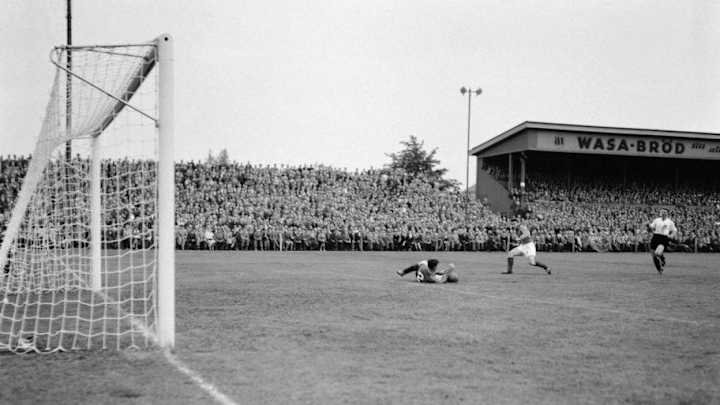World Cup Countdown: 16 Weeks to Go - The 13 Players That Represented Debutant's Scotland In 1954

1954 was Scotland's first foray into World Cup football, and it is not one they look kindly upon today.
After qualifying via the 1953-54 Home Championships, the Scots would travel to Switzerland for their first taste of World Cup football, and hopes were high. Scotland were in the midst of somewhat of a purple patch at club level. Rangers were the dominant side at the time, but Hibs, Celtic, Aberdeen and Hearts were all competitive sides who would take turns at winning the league before the decade was out.
Despite the strength of Scottish football, Rangers did not allow many of their players to leave their tour of America for the World Cup, while Celtic only allowed three of their men to travel. The Old Firm sides had very little influence on this Scotland team; in fact, it was one of the least Old Firm-centric squads Scotland has ever seen.
(You may also be interested 'World Cup Countdown: 16 Weeks to Go - Is Sandor Kocsis the Greatest Goalscorer of All Time?')
Amazingly, given the resources at Scotland's disposal in the early 1950s, only two players had more than 10 caps going into the World Cup - Celtic's Bobby Evans and Blackpool's Allan Brown.
To make matters worse, the SFA ruled that the nation could only take 13 players to the tournament rather than a squad of 22, and these 13 players combined had only one more cap than England's Billy Wright had amassed on his own. Scotland's team was clearly lacking experience.
Sammy Cox, George Young, Willie Waddell and Willie Woodburn onboard the SS Empress heading towards Canada / USA for their clubs 1954 tour. Bizarrely Scotland would be heading in the opposite direction for the 1954 World Cup. pic.twitter.com/bwGQDITHAW
— Scotland Forever! Football Magazine (@davstu11) February 13, 2018
The group Scotland were drawn in did not make life any easier either. Although they would only play two games, the Scots faced reigning champions Uruguay as well as a tough test against Austria.
In their inaugural World Cup match, Scotland played Austria in Vienna, where they would succumb to an unlucky 1-0 defeat.
Despite a loss in their first ever World Cup match, Scotland did not perform too badly and held out for the opening half hour before Erich Probst scored for the Austrians. A flurry of opportunities came and went, but at the final whistle, the Scots knew they should not be too disheartened by their failure to win their first game.
The Scotland squad flying out to the 1954 World Cup ! inc. #partickthistle's JImmy Davidson @TDscot7069 pic.twitter.com/B7is3oE1r8
— stuthejag (@stuthejag) June 29, 2015
(You may also be interested in 'World Cup Countdown: 16 Weeks to Go - Ferenc Puskas, the Galloping Major Who Led the Magical Magyars')
However, what happened after the match was much more detrimental to Scotland's qualification hopes than the result of the match itself.
Shortly before their next game where they would face the current World Cup champions Uruguay, manager Andy Beattie resigned due to his anger towards the SFA's awkwardness and lack of willing to send a capable squad out to Switzerland.
This left the team managerless in what was Scotland's toughest fixture they had played since their entry into the world of football. Uruguay had never before been beaten at a World Cup, and it didn't look like Scotland were going to be the team to change that.
Was something remarkable on the cards?
Nope. Scotland got hammered 7-0 and knocked out of the competition. They had conceded a staggering eight goals in two games and had failed to score in both. Not much blame can be put on the players however, as they were inexperienced, improperly organised and simply doomed to fail.
Sammy Cox, George Young, Willie Waddell and Willie Woodburn onboard the SS Empress heading towards Canada / USA for their clubs 1954 tour. Bizarrely Scotland would be heading in the opposite direction for the 1954 World Cup. pic.twitter.com/bwGQDITHAW
— Scotland Forever! Football Magazine (@davstu11) February 13, 2018
(You may also be interested 'World Cup Countdown: 17 Weeks to Go - Brazil's Prolific Nearly Man, Ademir')
Dismayed and heartbroken, the Scottish players prepared for their flight home with a gloomy sense of failure. Any hope they had going into the competition was quickly dashed, and the circumstances that faced them meant that any degree of success was unlikely.
Things could only get better, and they would. Over the last fifty years, Scottish football has witnessed the talents of Denis Law, Billy Bremner and Kenny Dalglish to name but a few, and there have been many memorable World Cup moments for the Scots.
Unfortunately for those in 1954, football didn't seem to be Scotland's greatest asset as a nation, and the journey back from Switzerland for those who had travelled, including all the players' wives, can't have been an enjoyable one.
